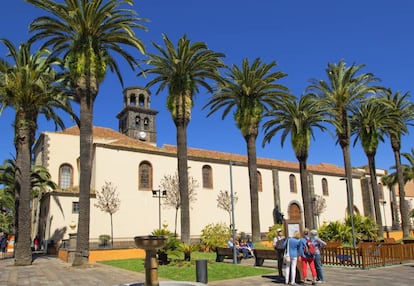The Spanish town where they talk backwards
La Laguna wants its curious ‘Verres’ language to be recognized as a UNESCO Intangible Cultural Heritage

A barber by the name of Francisco Fariña was the first person to use ‘Verres’ at his barbershop in Juan de Vera Street in La Laguna, Tenerife, back in the 1930s. Something of a practical joker, he was said to have invented this way of talking, in which he scrambled the letters and syllables of words to confuse his customers – particularly those coming from rural areas – while he cut their hair. More than 80 years later, La Laguna locals are making a bid to have Verres recognized as an Intangible Cultural Heritage.
In Fariña’s day, La Laguna was a quiet place with no TV or other forms of entertainment in the home. In lieu of TV, barbershops like pharmacies, became places to socialize. As the official chronicler of the town’s history, Eliseo Izquierdo, says, “People went there to kill time and read the paper and each barbershop – authentic schools of invention, of sharp and implied language – had its parishioners.”
Although it has survived the passage of time, verres is now almost exclusive to people over 60
Thanks to his caustic sense of humor, Fariña popularized Verres to the point where students from La Laguna University would come to study it with him in his ‘academy.’
In one instance, at the end of the 1950s, a group of chemistry students from Barcelona University came to the city on an end-of-term trip and found themselves trumped by the ingenious word game.
After lunch at a local restaurant hosted by the mayor, Lupicinio Arbelo, one of the students stood and delivered a speech in Catalan. Having understood nothing, the Mayor replied to the speech in Verres, giving them a taste of their own medicine, recalls Izquierdo, who was there to cover the event for a local newspaper.
Disconcerted, the students asked the Mayor what he had said, to which he replied that they should be first to clarify the meaning of their speech. The students explained that they had expressed their gratitude for the warm welcome and their surprise at finding such beautiful countryside. Satisfied, the Mayor told them that he had said much the same to them.
Verres has never been peculiar to a specific area of La Laguna nor has it ever been spoken by everyone. It’s simply an amusing way of talking between friends and acquaintances. And although it has survived the passage of time, it is now almost the exclusive preserve of people over 60.
However, the neighborhood association of Casco de La Laguna Casco is now advocating extending the use of Verres, targeting young people with talks in schools.
One member of the association, Juan Oliva, a retired lawyer who is proud of his handle on Verres, says that the language has its own rules and that the scrambled words don’t always consist of the same letters as the original. For example, while ‘Mosva al neci’ (vamos al cine – let’s go to the cinema) does contain the same letters, ‘la nelu nel tomimorfa’ (la luna en el firmamento – the moon in its firmament) does not. The language could be considered a more complicated version of Pig Latin or rhyming slang in English or the Verlan argot of French.
“La Laguna is the only place in the world where they speak back to front, which is why we would like UNESCO to consider making it an Intangible Cultural Heritage,” he says. Oliva can sing La Canción de Pirata (The Pirate’s Song) by José de Espronceda in Verres but has been challenged by the carol Alegría, Alegría (Joy Joy), which he sings as Agriale with a little help from a cheat sheet.
La Laguna is the only place in the world where they speak back to front La Laguna Casco association member Juan Oliva
It won’t be easy to get Verres the recognition Oliva and his companions are seeking. Although Lunfardo, originally prison slang in Buenos Aires, has been absorbed into the Spanish language in Argentina, the Professor of Spanish Language at La Laguna University and the Vice President of the Language Academy of the Canaries, Humberto Hernández, say the study of Verres has never occurred to them “since it is little more than a linguistic game.”
Similarly, Elfidio Alonso, director and founding member of Los Sabandeños – a Canarian folk group – who speaks Verres, believes that it shouldn’t be given more importance than it had when it began. “It wasn’t a phenomenon that involved the entire town, just some young gentlemen who used it to have a laugh and a good time,” he says. On the other hand, the song Isa Lagunera dedicates a line to the language: “Nasbue chesno neragula, chesno de lohie y de ofri”, meaning “Buenas noches lagunera, noches de hielo y frío” – or “Good evening people from La Laguna, nights of ice and cold.”
English version by Heather Galloway.
Tu suscripción se está usando en otro dispositivo
¿Quieres añadir otro usuario a tu suscripción?
Si continúas leyendo en este dispositivo, no se podrá leer en el otro.
FlechaTu suscripción se está usando en otro dispositivo y solo puedes acceder a EL PAÍS desde un dispositivo a la vez.
Si quieres compartir tu cuenta, cambia tu suscripción a la modalidad Premium, así podrás añadir otro usuario. Cada uno accederá con su propia cuenta de email, lo que os permitirá personalizar vuestra experiencia en EL PAÍS.
¿Tienes una suscripción de empresa? Accede aquí para contratar más cuentas.
En el caso de no saber quién está usando tu cuenta, te recomendamos cambiar tu contraseña aquí.
Si decides continuar compartiendo tu cuenta, este mensaje se mostrará en tu dispositivo y en el de la otra persona que está usando tu cuenta de forma indefinida, afectando a tu experiencia de lectura. Puedes consultar aquí los términos y condiciones de la suscripción digital.








































